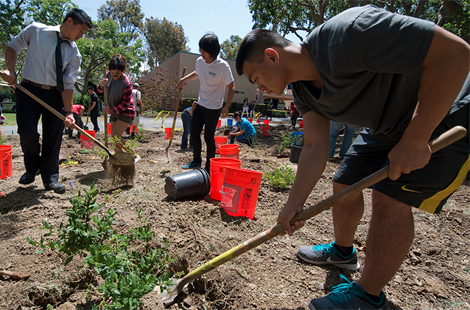UC Irvine is ‘Coolest School’ in nation

UC Irvine is ‘Coolest School’ in nation
- August 13, 2014
- Sierra Club ranking reflects campus commitment to energy efficiency, sustainability
 UC Irvine has placed first in Sierra magazine’s eighth annual ranking of the country’s “Coolest Schools,” marking the fifth
consecutive year the university has been included among the top 10 “greenest” campuses
nationwide.
UC Irvine has placed first in Sierra magazine’s eighth annual ranking of the country’s “Coolest Schools,” marking the fifth
consecutive year the university has been included among the top 10 “greenest” campuses
nationwide.
The Sierra Club publication’s September/October cover story spotlights what colleges are doing to address climate issues and operate sustainably. It commends UCI for its academic and research achievements in those endeavors; its three on-campus solar projects; and its energy efficiency goals that consistently exceed federal and state guidelines.
The Sierra ranking also acknowledges campuses that encourage environmental responsibility through research and education, student engagement and innovation. The complete list is available at www.sierraclub.org/coolschools.
“At our commencement ceremony this year, President Obama praised UCI for being ‘ahead of the curve’ on climate change research, energy efficiency and sustainability,” said Howard Gillman, interim chancellor and provost. “Sierra magazine’s No. 1 ranking is further recognition of our national leadership in these areas.”
The distinction comes on the heels of the U.S. Department of Energy recognizing UCI for surpassing its Better Buildings Challenge goal of improving campus energy efficiency by 20 percent by 2020. UCI was the first educational institution in the nation to meet or exceed this objective, and it did so seven years early – consuming 23 percent less energy in 2013 than in 2008, the base year for its commitment to the federal Better Buildings Challenge.
“We value the Sierra Club’s acknowledgment of UCI’s leadership in this arena, and we’re honored to be in the company of other institutions with distinguished reputations for environmental stewardship,” said Wendell Brase, vice chancellor for administrative & business services and co-chair of University of California President Janet Napolitano’s Global Climate Leadership Council.
UCI’s award-winning energy management program, which helps reduce its carbon footprint, has been in place for 25 years. In addition, more than 200 faculty members conduct research and provide instruction on such topics as conservation biology, ocean health and water resource administration; atmospheric chemistry and global systems modeling; energy conservation, power generation and transportation; climate change-related famine, disease and poverty; and land-use planning, environmental law, public health and social justice.
The campus’s new Sustainability Initiative – supported by Gillman and directed by Travis Huxman and Abby Reyes – brings together UCI’s talents in research, education, engagement and philanthropy. It has fostered the creation of major projects on flood resilience along the coast and sustainability in the desert; cutting-edge curricula; and, in concert with Student Affairs, a sustainability resource center for students.
“This innovative initiative enables UCI to strengthen its leading role in addressing critical sustainability challenges in California and around the globe,” said Al Bennett, vice provost for academic initiatives.
The university also offers a minor in global sustainability, and its Department of Earth System Science was the first of its kind in the nation to study human impact on the environment in an interdisciplinary way.
UCI is home to more than a dozen student organizations focused on sustainability issues, among them The Green Initiative Fund, which supports a variety of sustainability efforts on campus; PowerSave Campus, a student-driven energy efficiency education program; and the Real Food Challenge, which advocates a more sustainable food system.
Other examples of sustainable operations at UCI include:
Laboratories and buildings
- UCI has developed the Smart Labs Initiative, which safely reduces energy use in new and retrofitted research laboratories by an average of 60 percent.
- Twelve campus structures have received the U.S. Green Building Council’s Leadership in Energy & Environmental Design Platinum certification, and eight more have LEED Gold status.
Waste management
- UCI has significantly expanded its commingled recycling effort, vaulting its waste diversion rate from 58 percent to 83 percent over the past five years. This is material that’s being reused or recycled instead of being sent to local landfills.
- Five campus buildings are certified as “zero waste” because they divert 95 percent or more of their waste.
Hydration stations
- To reduce bottled water waste, the campus hosts hydration stations where beverage containers can be refilled with filtered water.
Transportation
- UCI encourages students, faculty and staff to use alternative means of transportation to decrease both the number of cars on campus and the volume of harmful emissions. Commuting options and incentives include carpool matching services, vanpools, subsidized OCTA bus passes, rebates on train tickets, bike sharing and Zipcars.
Hospitality & dining services
- Meatless Mondays, Weigh the Waste events and the labeling of entrees’ carbon “foodprints” have been instituted.
“For eight years, Sierra magazine has encouraged America’s colleges and universities to fully embrace their unique and multifaceted role in tackling the climate crisis and protecting America’s air, water, public health and beautiful places,” said Bob Sipchen, the publication’s editor in chief. “From innovative research and development to powering campuses with wind and solar and educating students in the most advanced thinking on sustainability, colleges and universities are leaders and models for the rest of society.”
-Laura Rico, UCI Communications
Share on:


connect with us